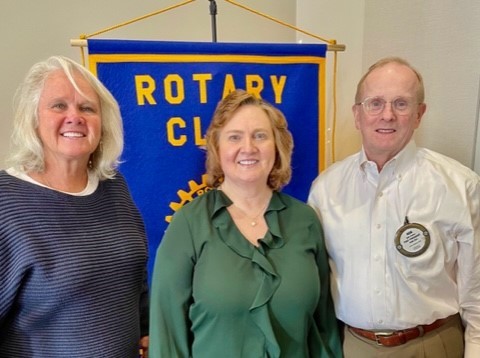Many technology experts trace the origins of our computer world of today to 1971 with Intel’s invention of the first microprocessor. But it was not until the 1990s that personal and home computers became household items, changing our world forever.
And this next great wave of technology began many years ago as well – Artificial Intelligence (AI). It was being talked about and developed after 1952 when a computer scientist named Arthur Samuel developed a program to play checkers, which is the first to ever learn the game independently.
Not long after, we began to hear about AI and today the term is pervasive. Lynne E. Parker Ph.D., a Knoxville native, spoke to the Rotary Club of Farragut on Nov. 29, and her topic was “Artificial Intelligence Explained.”
This was an introductory 45-minute lecture with a great Q&A session about this rapidly emerging technology.
Parker is one of the major U.S. experts on AI. If you don’t know her, here’s what jumps out. From 2018 to 2022, she worked in the White House as the deputy chief technology officer and was the director of the National Artificial Intelligence Initiative Office.
In those roles, she oversaw the development and implementation of our country’s national AI strategy. She returned to the University of Tennessee last year and is now associate vice chancellor and director of the new AI Tennessee Initiative at UT and for the state. She will lead the university’s strategic vision and strategy for multidisciplinary artificial intelligence education and research.
Her undergraduate degree is from Tennessee Tech and she completed her master’s degree in UT’s Min H. Kao Department of Electrical Engineering and Computer Science. She earned her doctorate at the Massachusetts Institute of Technology (MIT). She joined UT’s faculty in 2002 when she founded the Distributed Intelligence Laboratory, where she broadened research and knowledge into multi-robot systems, sensor networks, machine learning and human–robot interaction.
AI is real. It’s here. It’s going to continue growing across all sectors of our business and society, she said – healthcare and medicine, energy, education, forestry, agriculture, information technology, manufacturing and materials, and transportation and logistics. AI jobs in those eight sectors will be in demand, she added.
Many people worry about what impact it will have. Will it be practical or fake and will it replace people and their jobs? Here are some of her main points about AI:
- “We already have AI in our lives. Cars. TVs. Social media search engines, cell phones. Siri is AI. Language information and handwriting analysis, creating images of people who don’t exist, robotic processes.”
- “By 2030, AI’s market size in just the U.S. is predicted to be $1.8 trillion (with a T). Today we can’t envision all of the applications for AI, but it will be huge.”
- “This fact is troubling. American students rank among the lowest worldwide in the use of AI tools. Our country and young people had better get up to speed on AI or our country will drop behind more than we are now.”
- “AI will disrupt nearly every industry and state in the U.S. As for job losses, some of that will happen. AI may augment jobs or replace people. Over 500,000 jobs in Tennessee are expected to be augmented or replaced by AI. Someone using AI could take your job along with those who learn to work and manage AI. The ones who don’t will lose jobs. Keep in mind that 60% of today’s workers are in occupations that didn’t exist in 1940.”
Parker also addressed ethics. “Problem areas for AI include potential discrimination and built-in biases; government transparency; safety and security issues; scammers; privacy issues; people who want to maintain their power; mass surveillance as they do in China; stopping or creating dissent; development of regulations to control the bad actors. That is going on now.”
Parker concluded with these points: “AI is pervasive, and it’s here to stay. It will continue to be an economic and workforce disruptor. Broader challenges of AI are surfacing, with significant policy development needed. Tennesseans can work together to proactively navigate the AI transformation and leading that transformation is part of our mission.”
In August 2022 the “MIT Technology Review,” a bimonthly magazine wholly owned by the Massachusetts Institute of Technology, and editorially independent of the university, published an interesting story about Parker. You can click on this LINK to read it:
https://www.technologyreview.com/2022/08/23/1058412/white-house-ai-director-challenges/
Tom King is a career journalist and a past president of the Rotary Club of Farragut, which meets each Wednesday at 12:15 p.m. at the Farragut Community Center, 239 Jamestown Blvd. If you want more information about Rotary or are interested in attending a meeting or joining, please email Tom or text him at 865-659-3562.

